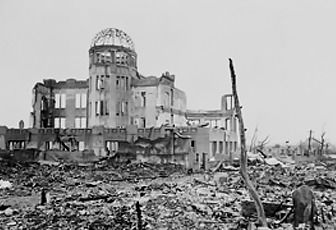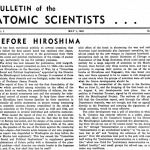Hiroshima and the Iran agreement
By Rachel Bronson | August 6, 2018

Editor’s note: This Bulletin column was originally published in 2015.
Seventy years ago this week, the United States dropped the first of two nuclear weapons over Japan, the only times nuclear weapons have been deployed in war. The carnage at Hiroshima was immediate, horrific, and extensive. Between 60,000 and 80,000 people died instantly, about half the number of those who ultimately died over time as a result of the explosion.
Tragic as it is, the Hiroshima anniversary—coming during the heated debate over the Joint Comprehensive Plan of Action (JCPOA), an agreement between the international community and Iran to curtail Iran’s nuclear program—is also timely. The anniversary provides an opportunity to reflect on lessons learned (or not learned) from nuclear war and seven decades of trying to prevent its recurrence, and to apply that knowledge to the current situation in the Middle East.
Today, critics of the Iran agreement rightly point out that it will not solve all the region’s security problems; that it cannot be verified with total confidence; and that it may not change Iran’s intent to acquire nuclear weapons in the future. But such all-encompassing results were never realistic expectations for any plan to limit Iran’s nuclear program. Arms control agreements are not, and have never been, magic bullets. But they have proven themselves to be effective in forestalling a nuclear exchange—a reality that has been increasingly forgotten, as we’ve moved farther from the horror of Hiroshima. At least five lessons from seven decades of nuclear diplomacy can help shape today’s debate about the Iran agreement and put it into historic perspective:
Lesson One: Nuclear weapons are different from other weapons. Some have questioned the exceptional power of a nuclear explosion by pointing to the fire bombing of Dresden in 1945, only months before the bombing at Hiroshima. On one murderous night in February of that year, the entire city of Dresden was flattened and 25,000 lay dead. But it takes only one nuclear bomb to wipe out a city, and the binary, all-or-nothing quality of nuclear attack is one of the characteristics that make nuclear weapons unique. A Dresden-like, conventional bombing campaign can be stopped at multiple stages. Not so a nuclear attack.
In today’s debate over Iran, some analysts have pointed out that the JCPOA will not alleviate the threat of a conventional Middle Eastern war and might even escalate the chances of proxy wars, as Iran and other Middle Eastern powers attempt to establish regional dominance. And Saudi Arabia’s air campaign against Yemen (in response to Iranian support of Houthi rebels there) could well portend an increasingly violent future, notwithstanding the successful implementation of the Iran nuclear deal. But even if conventional military activities increase in the wake of a nuclear deal, the possible scale of destruction is profoundly reduced. Removing the nuclear threat from the chaotic Middle East may not make the region peaceful. But it will greatly reduce the likelihood of a nuclear exchange between Iran and Israel or the United States—an exchange that would cause millions, if not hundreds of millions, of casualties.
Lesson Two: Flawed arms control agreement can contain the spread of nuclear weapons. The 1970 Non-Proliferation Treaty (NPT) has been credited with forestalling the spread of nuclear weapons. In a chart that every student of arms control knows quite well, the difference between the number of countries that were expected to acquire nuclear weapons in 1970 and the much smaller number of eventual nuclear countries is quite stark. In short, the Non-Proliferation Treaty has restrained proliferation.
But the NPT was flawed from the start; it seemed to prioritize the advantages of trade in “peaceful” nuclear technology over the risks that trade posed to international security. A series of follow-on agreements, safeguards, and restrictions were required to patch the proliferation loopholes in the NPT. Still, the treaty provided a framework that was augmented and bolstered across time, and it has worked to slow proliferation. The JCPOA will require just such attention, patching, and bolstering if it is to be fully effective. The Iran deal is not the end of a process, but in many ways, only the beginning.
Lesson Three: Arms control agreements are often faulted on verification grounds. Ronald Reagan faced criticism about verification and compliance measures in the Intermediate Nuclear Forces (INF) treaty he and Mikhail Gorbachev signed in 1987—even though that agreement contained one of the most advanced and comprehensive inspection regimes assembled to that time. But history has shown it far safer to install tripwires than to let nuclear programs evolve unrestrained. Although it is under strain now, the INF has worked to reduce nuclear tensions in Europe for more than a quarter century.
Lesson Four: Nuclear deterrence works. As crazy and illogical as it seemed to some, Mutually Assured Destruction did keep the United States and Soviet Union from using nuclear weapons against each other. The knowledge that using nuclear weapons has profound consequences on the sender has deterred their use for 70 years. If it ever did acquire nuclear weapons, Iran would face a situation of seemingly enormous deterrence. It faces a nuclear-armed Israel, which has overwhelming superiority in conventional and nuclear military technology, in large part because it has received overwhelming amounts of military support from the United States for decades. If it acquired and then decided to use the Bomb, Iran could hurt Israel very badly. Israel’s response, however, would wipe Iran off the map (not even to mention the possibility of retaliation from Israel’s ally, the United States). This reality of overwhelming military dominance allows Israel to operate from a much stronger position than many of its supporters acknowledge.
Lesson Five: Arms control agreements don’t end conflict. The Cold War was defined by violent proxy wars across the globe, even as the United States and Soviet Union built agreements to restrain the use of their most powerful weapons. Those arguing today that if the JCPOA goes forward and economic sanctions are lifted, Iran will plow billions of dollars from formerly frozen bank accounts into Hezbollah and other regional proxy groups may be correct (although US intelligence reports suggest far less spending on proxies than some critics of the agreement assert). But keeping Iran from getting the bomb will remove a threat that until recently most regional actors pointed to as their overriding concern.
The Hiroshima anniversary serves as a reminder of how high the stakes are when it comes to nuclear conflict and disarmament. The tragedy at Hiroshima forced the world to begin to learn to deal with nuclear weapons. The subsequent 70 years offer important lessons for today’s arms control debate. Seventy years after Hiroshima, the Iran deal is the latest achievement in a continuum of arms control efforts that have staved off more Hiroshimas.
As history shows, the JCPOA does not provide a reason to rest easy. Rather, it is one step in a broader effort to make the Middle East safer and more stable over time. To reach this end, considerable work is still needed. But we owe it to the ever-receding memory of Hiroshima to do all that we can to reduce to the risk of nuclear warfare wherever and whenever possible.
Together, we make the world safer.
The Bulletin elevates expert voices above the noise. But as an independent nonprofit organization, our operations depend on the support of readers like you. Help us continue to deliver quality journalism that holds leaders accountable. Your support of our work at any level is important. In return, we promise our coverage will be understandable, influential, vigilant, solution-oriented, and fair-minded. Together we can make a difference.
Share: [addthis tool="addthis_inline_share_toolbox"]















“And Saudi Arabia’s air campaign against Yemen (in response to Iranian support of Houthi rebels there)” Upon what do you base that statement? Truman said the nuking of Japan was necessary to save 1 million American lives. Do you just take his word for it? Saudi invaded because the man they supported was deposed (after he extended his tenure and refused to power share as previously agreed). Iranian ‘support’ for the Houthi alliance was next to non-existent at the time – other than rhetorical. It barely exists now. This is not to portray Iran as some kind of progressive paradise.… Read more »
well written and to the point Rachael.
C’est faux de dire l’enjeu du désarmement nucléaire d’Iran est celui d’ Hiroshima et Nagasaki. Sinon, le problème est plus général est cet incident catastrophique pouvait se reproduire avec le Pakistan, l’Inde, la Chine y compris les USA et dans une certaine mesure Israël a menacé plus d’une fois de réduire le Liban et l’Égypte en cendre !! Certes les accords sur le désarmement nucléaire avec l’Iran , la Corée du Nord devraient avoir une importance et une réussite obligatoire ,dans les nouvelles négociations avec les américains . D’où l’importance de la rencontre avec Kim Jung-Un et avec les mollahs d’Iran… Read more »
C’est faux de dire l’enjeu du désarmement nucléaire d’Iran est celui d’ Hiroshima et Nagasaki. Sinon, le problème est plus général est cet incident catastrophique pouvait se reproduire avec le Pakistan, l’Inde, la Chine y compris les USA et dans une certaine mesure Israël a menacé plus d’une fois de réduire le Liban et l’Égypte en cendre !! Certes les accords sur le désarmement nucléaire avec l’Iran , la Corée du Nord devraient avoir une importance et une réussite obligatoire ,dans les nouvelles négociations avec les américains . D’où l’importance de la rencontre avec Kim Jung-Un et avec les mollahs… Read more »
why don’t we criticize the only Nuclear Bomb user country under the name of USA all the time?
why don’t we put the pressure on USA to come to the negotiation table over its Nuclear Bomb arsenal??? Let’s realize the fact.